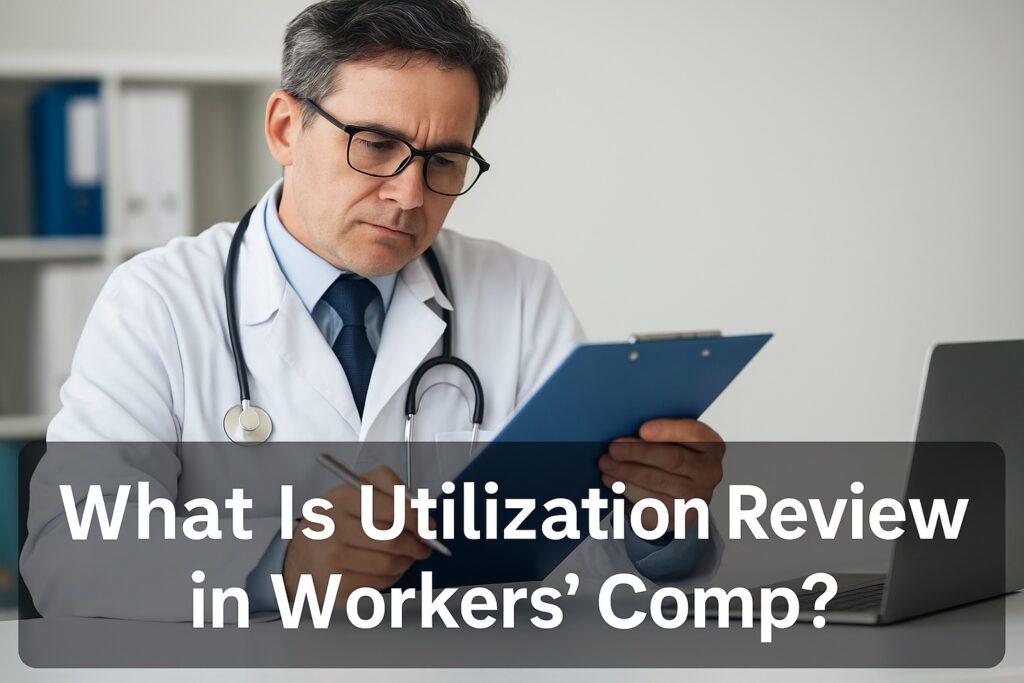
If your doctor recommends treatment for a work injury, you might assume it will be automatically approved. But in California’s workers’ comp system, even your doctor’s orders must go through Utilization Review (UR) — a process that often delays or denies care.
Understanding how UR works — and when to challenge it — is key to protecting your right to proper treatment.
🔹 What Is Utilization Review?
Utilization Review (UR) is the insurance company’s process of reviewing whether your doctor’s recommended treatment is medically necessary according to California’s Medical Treatment Utilization Schedule (MTUS).
It’s essentially the insurer’s way of saying: “Let’s get a second opinion before we pay for this.”
UR applies to:
- Surgeries
- Diagnostic tests (MRIs, CT scans)
- Medications
- Physical therapy
- Injections
- Psychiatric care
- And more
The review is conducted by a physician reviewer, who is often not your treating doctor, and may never have examined you in person.
⏱️ When Does UR Happen?
UR must be conducted within strict timelines, depending on the urgency:
- Prospective Review: Before treatment occurs (standard timeline: 5 business days).
- Concurrent Review: While treatment is in progress (usually when extending a service).
- Retrospective Review: After treatment has already occurred (less common, often disputed).
If the UR timeline is violated, you may be able to challenge the denial on that basis alone.
🚫 What Happens If UR Denies Care?
You’ll receive a written denial (or modification) of the treatment, including:
- Reason for denial (often citing MTUS)
- Name and credentials of the reviewer
- Instructions on how to request an Independent Medical Review (IMR)
This is when many injured workers start to feel stuck — but don’t give up. IMR allows you to appeal the UR denial and have it reviewed by an independent doctor who isn’t connected to the insurance company.
✅ When Should Utilization Review Be Used?
UR is required by law for most treatment decisions in California workers’ comp. That said, certain exceptions apply:
- First 30 Days of Treatment: Employers may have more control over your care, but UR can still apply.
- Emergency Treatment: UR cannot delay emergency care that is necessary to stabilize your condition.
- Exempt Conditions: Some ongoing or post-surgical care may be exempt if previously authorized.
An experienced workers’ comp attorney can determine whether a UR denial is valid or challengeable.
🛡️ How EFLL Protects Clients During Utilization Review
At Employees First Labor Law, we’ve seen firsthand how insurance companies misuse UR to deny critical care. That’s why we:
- Fight for timely treatment approvals
- Challenge improper or delayed UR decisions
- File for Independent Medical Review (IMR) when appropriate
- Escalate the case to trial or expedited hearing if necessary
Your health isn’t just a file on someone’s desk — it deserves attention and urgency. We make sure the law protects you.
🔹 Why Choose Employees First Labor Law?
We’ve helped thousands of injured California workers navigate the UR and IMR process. Our team:
✅ Works with top treating physicians and medical experts
✅ Knows how to build strong records to survive UR
✅ Fights lowball medical decisions and delays
✅ Secures full medical care, disability payments, and long-term benefits
📞 Contact EFLL for a free consultation today.
We’ll fight to get your treatment approved and ensure your recovery isn’t left in the hands of bureaucracy.
📩 Schedule a consultation
📞 Call us now to speak with a workers’ comp attorney



